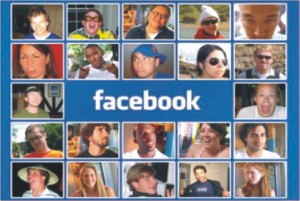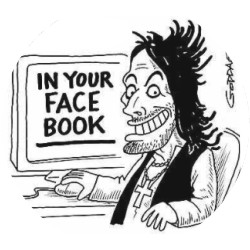Last & Least
Defacing and effacing
facebook
Dr Binoy Barman
 IN recent time there has been incidence of defacing facebook, the most popular social network website in the world, and the subsequent neutralisation attempt through effacing it altogether. Defacing has come through the misuse of facebook in the form of indecent comments, caricature and photographing. The counteracting measure has also been harsh -- total obliteration of the website. Defacing of facebook has led to its effacing. Obviously things have gone wrong. Neither defacing nor effacing is desired. Those who misuse technology commit the first offence, and those who kill it commit the second offence. Defacing can be combated in two ways: the first measure is technical and the second is legal. Technically, the authorities may cut the objectionable parts off the website and obstruct its public display. Legally, the misuse may be tried under cyber-crime law and due punishment may be sanctioned for the offenders. There should also be widespread campaign for the fair use of technology to make people conscious. Effacing is not the right solution to defacing. IN recent time there has been incidence of defacing facebook, the most popular social network website in the world, and the subsequent neutralisation attempt through effacing it altogether. Defacing has come through the misuse of facebook in the form of indecent comments, caricature and photographing. The counteracting measure has also been harsh -- total obliteration of the website. Defacing of facebook has led to its effacing. Obviously things have gone wrong. Neither defacing nor effacing is desired. Those who misuse technology commit the first offence, and those who kill it commit the second offence. Defacing can be combated in two ways: the first measure is technical and the second is legal. Technically, the authorities may cut the objectionable parts off the website and obstruct its public display. Legally, the misuse may be tried under cyber-crime law and due punishment may be sanctioned for the offenders. There should also be widespread campaign for the fair use of technology to make people conscious. Effacing is not the right solution to defacing.
In the last week of May 2010 the government of Bangladesh took a decision to ban facebook. In one week, however, it also withdrew its decision. I should say it was an abrupt decision, showing no deep contemplation and proper justification. The apparent reason was portrayal of cartoons of the political leaders of the country. Since the experts in bureaucracy could not solve it in a technical way, the whole site was wiped out. It was similar to cutting the whole tree when problem lies only in one branch. In the present case, the whole head has been cut off because of the disturbance of headache. The decision was an unfortunate and unwelcome one, resented and protested by the IT experts and IT-conscious students of the country. Such kind of decision, in fact, was not at all expected of the government that is committed to establishing a Digital Bangladesh. With the defacing move, the government starkly contradicted itself!
Facebook has been an integral part of modern life. People from all around the world get together though this blog and express their thoughts and feelings. It is a fantastic tool of information technology to be acquainted with one another with a sense of community. This is obviously a 'virtual community'. The bloggers are not physically meeting but they are showing their presence in a group, electronically. This virtual community is safer than a physical community. To assemble in a place, people have to take the trouble of travelling, which entails the risk of accident. But for virtual community, one can take part in the assembly, sitting at home, office or cyber café. There is no hazard of jostling or crying at the top of one's voice.
Facebook has satisfied its users with a good measure of excellent features. It is easy to open an account in facebook; it involves just putting in some basic information and then several clicks. One can invite any person to be his/her friend. As soon as a person accepts the invitation, he/she becomes a member of the group and thus a network is formed. A person can send any message to any member in the network any time. Even he/she can share something with all of them together with just a click. The network members are only a click away from one another, however geographical distance there may be, to receive and respond to the message. One may upload personal profile and photos as he/she wishes. One can publish anything he/she considers significant. One can also store digital information of any sort and retrieve them when necessary. It is a fantastic way of passing time through lively social interaction.
There are many other reasons of the tremendous popularity of facebook. Facebook communication is instantaneous. As soon as one writes something it instantly goes to the targeted readers, who may also reply to it instantly. So it is better than postal communication, which is time consuming. A letter in paper may take several days or weeks or months to reach the recipient, whereas in case of an electronic letter, it only takes a moment. This immediacy has a pleasant effect on the mind of communicators. They feel that they are meaningfully alive and active. It gives a sense of presence -- presence in the midst of others, whom one likes and loves. It also saves them from the anxiety of probable missing of message during the course of being carried.
 A very practical benefit of facebook is that it is free of cost. One need not pay a penny to create a network of friends and communicate with them every now and then. A phone call or a mail by postal service may cost certain amount of money. But facebook communication costs nothing. It is free but effective. So, who will not grab the opportunity? In any location of the world where there is computer and internet, there is facebook activity. It is used by students, teachers, traders, artistes, physicians, lawyers, engineers and people of all other professions. I know many persons who use it for various noble causes like fighting acid violence and forming public opinion against extremism. Not to be present in facebook or other social network site means somebody is virtually non-existent. He is no resident of the present world. He is pitiably lagging behind. A very practical benefit of facebook is that it is free of cost. One need not pay a penny to create a network of friends and communicate with them every now and then. A phone call or a mail by postal service may cost certain amount of money. But facebook communication costs nothing. It is free but effective. So, who will not grab the opportunity? In any location of the world where there is computer and internet, there is facebook activity. It is used by students, teachers, traders, artistes, physicians, lawyers, engineers and people of all other professions. I know many persons who use it for various noble causes like fighting acid violence and forming public opinion against extremism. Not to be present in facebook or other social network site means somebody is virtually non-existent. He is no resident of the present world. He is pitiably lagging behind.
Facebook has won the heart of the millions. People of all ages now use it from every nook and corner of the world. It is very natural that banning facebook will upset them. At this point in time, virtual social networking has assumed the shape of a fundamental right of the people. Banning it will be tantamount to the infringement upon their right. The facebookers will feel deprived if they are denied access to the interaction zone. Facebook may be banned but their zeal for blogging cannot be dampened. Dismayed, they will find alternative avenues to create social network. Already there are many other available blogs similar to facebook. The banning of facebook will only push people toward those alternatives. Blogging is a technological benefit and general people cannot be prevented from enjoying it at any cost.
The characteristic of the age of science and technology is that it will create new stuffs, tangible and intangible, from time to time as a mark of progress. Once there was radio, then came television, and now there is satellite TV. Once there was postal communication, then came land phone, and now there is mobile phone with bluetooth. One there was computing machine, then came PC, and now there is laptop with WiFi. All these have impacted and changed people's lives in various ways. New technology emerges to provide people greater benefits. In future also we will get novel things as the blessings of science. There will be no stop to it. The growth of science and technology cannot be gagged by any means. It is useless to try to do so. When the season of spring knocks at the door, uprooting one tree cannot stop blossoming. Those who cannot keep pace with the fast pace of change will just be outcasts. It is glaringly true for an individual as well as a society.
(The writer is Assistant Professor and Head, Department of English, Daffodil International University.)
|
